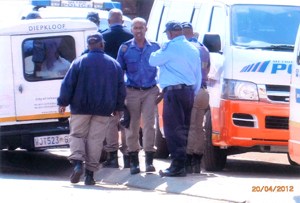 |
Our new hero is Ivory Park hawker Thato Mokobe*, who filmed Johannesburg Metro Police Department (JMPD) cops beating up a local resident in April. This is the first time such damning evidence has been recorded and exposed by a bystander. The article about the four cops kicking and stamping on Ivory Park resident Andries Ndlovu, 37, and pictures from the footage, were published in the Sunday Times on 29 April. This came mere days after Corruption Watch released a report revealing the extent of corruption within the JMPD. Ndlovu, who was assaulted after he attempted to stop the metro police from battering a 60-year-old hawker, Joseph Khumalo, suffered injuries to his face, body, arms and legs. The incident took place on Friday 20 April on uMnotho street in Ivory Park. Mokobe* used his cellphone to record the attack and submitted the video to the Sunday Times via sms. ‘They treat us like this all the time’ “We sent the video to the Sunday Times so that they could help us because the metro police treat us this way all the time,” said Dumisani Ngcobo*, another hawker, who was present at the time. Mokobe, the sole breadwinner for a family of five, told Corruption Watch that although the police had assaulted Ndlovu for about five minutes he had only filmed 22 seconds of the attack, fearing the officers might see him if he continued. “He [Ndlovu] is not even a hawker and he doesn’t have a business, but they still beat him up. So that’s why I took the video. They abuse everyone these police officers – they abuse the entire community.” uMnotho (isiZulu for wealth) street is a popular venue for vendors and shoppers can find anything there from fruit and vegetables to electrical appliances and window frames.“You can even buy a car here,” said one of the hawkers jokingly. “We sell everything.” “In a good month we make R2 500, and then we still have to pay rent for the stall and, where I live, I have to pay the person who helps me and for petrol to transport the goods,” said Mokobe. Businesses trading at the south end of the street pay homeowners an average of R500 a month to trade in front of their houses. 'They were coming back for war’ Police, said Mokobe, confiscate goods and issue hawkers with fines stating that their businesses are “obstructing pedestrian movement”, even though they only operate in a small area in front of residential buildings and keep most of the pavement clear. “Every time they take my goods, I worry about how I will be able to feed my family,” he said. Recalling the events of 20 April, Ngcobo told Corruption Watch that the metro police had visited the area twice that day. During the first visit they seized carpets, wardrobes, bathtubs, windows and window frames from hawkers who refused to pay a bribe. Then they drove off. “Within 30 minutes they came back,” said Ngcobo. “When they came back the second time, there were many of them. They came back in a [convoy] that included a truck, two Quantums, a van, a City of Joburg-branded Corsa, Isuzu, Citi Golf and Ford cars. They were coming back for a war." According to Ngcobo, the police started hitting Khumalo and when they were asked why, their leader said the old man was beaten because his son had “grabbed one of the window frames while the truck was moving”. “We don’t understand why they were attacking him – the window frames belonged to him,” said Ngcobo. Cops confiscate goods, no record of them being impounded When Ndlovu tried to defend the old man, the metro police started hitting him. He ran away and they chased him down the street. Two shots were fired and Ndlovu fell to the ground on the sidewalk, after which the police kicked and stamped on him, Corruption Watch heard. “They take our goods all the time and we don’t know what happens to them because when we go to the police station we can’t find them,” said Ngcobo. A victim of police intimidation himself, Mokobe told Corruption Watch that although the metro police had only started asking vendors on the south of uMnotho for bribes in the past two months, they had been harassing hawkers stationed outside the Ivory Park shopping centre at the other end of the street for years. “They usually ask for R50 per business every time they come.They threaten to give you a ticket for R2 000, then you’re forced to pay the bribe.”He had personally been asked for a bribe on two occasions. The first time he had paid R100 and when he refused to pay |
|
on the second occasion, the police confiscated his goods and told him he would have to pay thousands of rand to have them released from the Ivory Park police station. In fact, when he went to the police station his goods were not there and there were no records to show that they had been impounded. Most vendors who've had their goods confiscated had similar experiences. When he tried to open a case against the metro police, he was told to the case should be opened at the City of Joburg police station. What the bylaws say The Informal and Street Trading bylaw of 2008 states that “no person shall carry on the business of a trader on a public road, contiguous to a building used for residential purpose, if the owner or person in control or any occupier of that building objects”. Corruption Watch learned, however, that the informal traders stationed outside residential buildings on uMnotho street have permission from the homeowners to trade. The bylaw further stipulates that goods may be impounded if found in a place where street trading is restricted and that the restricted area must be clearly marked so that vendors know trading is not allowed. There are no such notices in uMnotho street.The bylaw provides for a maximum fine of R500 for vendors who are guilty of an offence, yet traders on uMnotho have been issued with fines of up to R2 000. According to Ngcobo, vendors who trade outside the shopping centre have also been harassed by police, who say their businesses are illegal, even though they are paying rent to the Informal Traders Association for their stands. Sometimes the police say “this is not Maputo where you can sell goods on the street”, said Dumisani Ngcobo. “They say ‘go back to Maputo’,” Ngcobo added, explaining that Ivory Park is home to many foreign nationals from countries such as Mozambique and Zimbabwe. The hawkers told Corruption Watch that a week after the story broke in the Sunday Times, metro police returned in a convoy that filled the entire street and allegedly destroyed stands and seized more goods. * Names have been changed to protect the individuals' identities. Read our first article on this incident here. |
|

